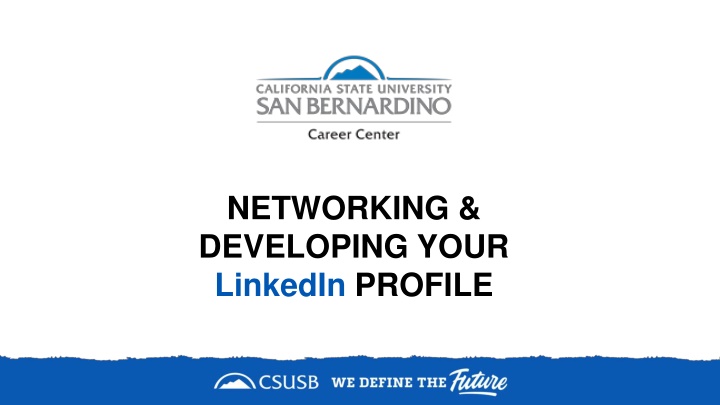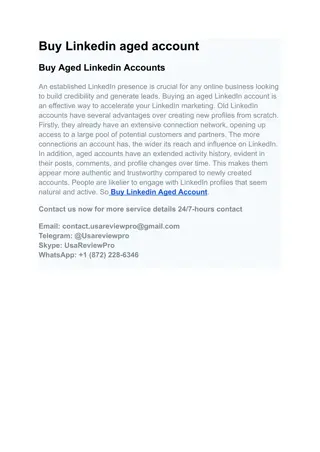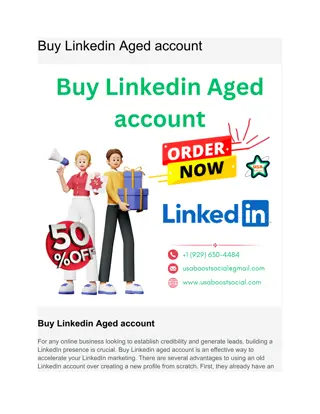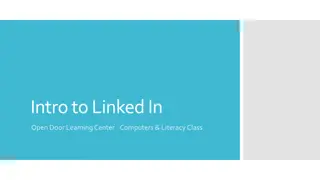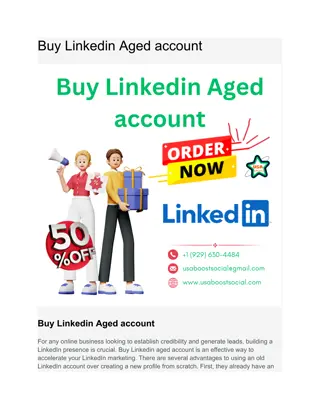Unlocking the Power of Networking and Developing Your LinkedIn Profile
Networking is a vital aspect of career growth. Learn the art of networking, both in-person and online. Discover the benefits of LinkedIn and how it can enhance your professional connections. Building a strong network opens up opportunities that may lead to career advancement. Utilize these strategies to expand and strengthen your network effectively.
Download Presentation

Please find below an Image/Link to download the presentation.
The content on the website is provided AS IS for your information and personal use only. It may not be sold, licensed, or shared on other websites without obtaining consent from the author.If you encounter any issues during the download, it is possible that the publisher has removed the file from their server.
You are allowed to download the files provided on this website for personal or commercial use, subject to the condition that they are used lawfully. All files are the property of their respective owners.
The content on the website is provided AS IS for your information and personal use only. It may not be sold, licensed, or shared on other websites without obtaining consent from the author.
E N D
Presentation Transcript
NETWORKING & DEVELOPING YOUR LinkedIn PROFILE
Overview Networking LinkedIn Features and Benefits of LinkedIn Steps in Profile Development Tips LinkedIn Usage
What is Networking? Talking with people who will learn about you and your interests, and then help you gain insight into your career options and goals It is a two-way process that involves developing and maintaining connections with individuals, and mutually benefitting from the relationship Is an ongoing process that takes time and attention; it is not something you do only when you are looking for a job
What is Networking? Successful networking requires preparation and practice Networking can be done in-person and online. A valuable tool for online networking is LinkedIn Remember, when you network, you are asking for information and advice not a job. It s not just what you know; it s also whom you know or can connect to
Why is Networking important? Will be the single most effective method of advancing your career While networking may not get you a job, it does play a role in the majority of hiring decisions Many job vacancies are never advertised, but instead filled through some form of personal or professional referrals Employers prefer to hire candidates they have met, or those referred by a trusted source
Build Your Network Networking opportunities occur on a daily basis and can include a brief conversation with someone on an elevator to an arranged meeting with a professional Identify all the people whom you come in contact with through your activities. These can include: Your friends, classmates, their parents and family members, neighbors. Your relatives and extended family. Former and current employers and co-workers. Members and alumni of professional associations, clubs, and organizations. Coaches, staff, faculty, or academic advisors. Alumni of any schools you ve attended.
Expand Your Network Attend campus career events and fairs, alumni presentations, and workshops Introduce yourself to any guest speakers you encounter on campus Obtain an internship and maintain contact with colleagues and supervisors Take advantage of job-shadowing programs Identify contacts by researching LexisNexis, industry/trade publications, employer websites, alumni magazines, and library resources Create a LinkedIn profile; connect to your contacts and join groups as appropriate
What is LinkedIn? https://youtu.be/ZVlUwwgOfKw
What is LinkedIn? The world s largest online professional networking platform Hosts the profiles of more than 500 million people in over 200 countries Serves as a recruiting tool for employers Serves as a job search tool for users
Features and Benefits of LinkedIn Establish your professional profile and control one of the top search results for your name. Build and maintain your professional network. Find and reconnect with colleagues and classmates. Learn about other companies, and gain industry insights. Find other professionals in the same industry using groups. Share your thoughts and insights through LinkedIn's long-form publishing platform. Tap into the knowledge of your network. Discover new career opportunities by searching for jobs.
Steps in Profile Development Sign-up: Name, email address, password Add location information Add profile photo (background image optional) Create a headline Write a summary statement Other key sections to complete: Showcase your unique professional story through your experience, skills, and education LinkedIn tips for students: https://students.linkedin.com/
Getting Started Go to the sign-up page at https://www.linkedin.com/start/join You can sign-up via your Facebook or Email account
Location Information Recruiters look for job seekers by location Adding your location makes you 23 times more likely to be found in LinkedIn searches Use a zip code that is close to the area where you want to work
Profile Photo Having no LinkedIn profile photo means your profile is not 100% complete According to LinkedIn, profiles with photos receive 21 times more views and 9x more connection requests LinkedIn Profile Photo Help: https://www.linkedin.com/help/linkedin/topics/6042/6059
Profile Photo Samples & Tips Professional head shot (is recommended) Plain background No distractions in view If taken outside, natural light works well Make sure you portray yourself as you want to be seen by your intended audience
Background Image LinkedIn has a standard option available to use or as a premium user you have access to LinkedIn stock images Another option is to create a custom background image using one of the following online tools: www.canva.com www.fotor.com www.picmonkey.com Background Image Help: https://www.linkedin.com/help/linkedin/answer/49960?query=background%20image
Ideas For Background Images LinkedIn stock image 2. Your product or service in the making 3. Your product or service in action 4. The skyline of your current city 5. Design your own 6. A personal image 1. Article: Seven ideas for an effective LinkedIn background image: https://www.linkedin.com/help/linkedin/answer/49960?query=background%20image
Profile Content Tips The first hurdle is to get found (to make sure you come up in the right kind of searches by recruiters). -Catherine Byers Breet, Longtime recruiter and adopter of LinkedIn (member since 2005) Use industry-relevant job titles and keywords Once you identify your top keywords, add as many of them to the following sections: Headline (most important), Current Job Title, Summary, Interests The LinkedIn search tool searches entire profiles, so insert your keywords throughout!
Examples Headline Depends on your LinkedIn profile goals Can be general and straightforward Can also tell viewers what makes you unique and includes as many keywords as possible Headline Help: https://www.linkedin.com/help/linkedin/topics/6042/6043/2901
Summary Statement Main place for you to stand out; adds a story element to your experience and your aspirations Be concise about your experience, qualifications, and goals with a compelling narrative weaved throughout (if possible) Describes what motivates you, what you ve done and are skilled at Use keywords and phrases that recruiters might search for (i.e. product management, graphic design, data analysis) https://www.linkedin.com/pulse/10-tips-students-new-grads-linkedin-omar-garriott
Summary Statement How to write a stellar summary: Set the scene: What is your ideal audience? What do you want them to know, learn, or do? How do you want to make them feel? Collect content What you do, accomplishments, values and passions, your superpowers , interesting stats, differentiation, validation (back up what you re saying) Source: https://www.forbes.com/sites/williamarruda/2017/07/09/how-to-write-a-stellar-linkedin-summary/2/#271686b3067a
Summary Statement https://www.linkedin.com/in/studentsample
Education Education is the foundation! Members who list a school get 10x more views on average Add your school, major, and degree name Include clubs you lead and honors you have earned
Experience When listing your experience: Avoid listing only duties and responsibilities Use action words and accomplishments Examples: Analyzedmaterials . Conductedindividual . List projects, organizations, classes, etc. Similar to resume Most related at the top
Skills List tangible skills that you are comfortable using in the workplace Skills can be acquired on the job or in school Speak Mandarin? Know JAVA programming? 17% more profiles views with 5+ skills listed
Tips to get you started Complete your profile Claim your unique URL Participate in groups Connect with people you know: Friends, family, classmates, mentors, teachers, and professors Use the alumni tool Actively update your profile
Participate in Groups LinkedIn Groups are hubs on LinkedIn which provide a place for professionals in the same industry or with similar interests to share content, find answers, post and view jobs, make business contacts, and establish themselves as industry experts. Being an active participant in a group can help you network with other professionals in your field, especially those outside your immediate circle https://blog.hootsuite.com/linkedin-groups/
Final Words...use LinkedIn to: Browse job descriptions Set up job alerts Follow Companies Influencers Industries---trends and news
Additional Resources Student Job Seekers: Tips to Building the Perfect LinkedIn Profile https://blog.linkedin.com/2016/11/14/student-job-seekers-tips-to-building-the-perfect- linkedin-profile LinkedIn Etiquette: 20 Do s & Don t s https://www.linkedin.com/pulse/20140417174121-34888774-linkedin-etiquette-guide-20- do-s-don-ts/
Career Center Information Main Campus Palm Desert Campus University Hall 329 Indian Wells 111 Phone: 909-537-5250 Phone: 909-537-8243 Email: careercenter@csusb.edu Email: pdccareercenter@csusb.edu Website: www.csusb.edu/career-center Website: https://pdc.csusb.edu/current- students/career-service
